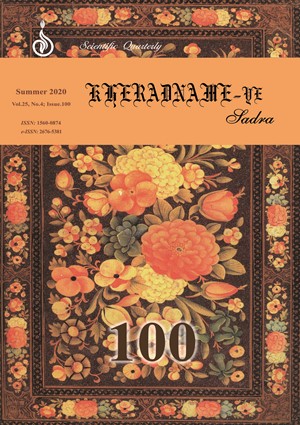From Wisdom to Functionalism: A New Analysis of the Nature of Mullā Ṣadrā’s Philosophical Paradigm
Subject Areas :
Hassan Rahbar
1
*
![]() ,
Hamid Eskandari
2
,
Hamid Eskandari
2
1 -
2 -
Keywords: wisdom functionalism life-course method Transcendent Philosophy Mullā Ṣadrā ,
Abstract :
The nature of Mullā Ṣadrā’s philosophical paradigm as a comprehensive system of philosophy has always been investigated by researchers in related fields. So far, eight views have been proposed in this regard; some of them consider Mullā Ṣadrā’s school to be a philosophical one; some others view it as a gnostic one, while others attribute a kalāmī nature to it. Nevertheless, his words and writings contradict these views. He mainly prefers to call his system of thoughts “wisdom”, which means the knowledge of God and His attributes and acts based on a mixed kalāmī-gnostic method. However, the writer believes that wisdom has no independent identity distinguishing it from philosophy, kalām, and gnosis and cannot be deemed as an independent school. Accordingly, in order to provide an accurate explanation of his system of thoughts, in addition to internal and content-based analyses, one should observe the external features of the world Mullā Ṣadrā lived in. Hence, from an external perspective, it apparently follows “consensus-creating functionalism”; that is, his school seeks to create functional unity among the three systems of thought. From an external perspective, it follows an anthropological life-course approach; in other words, one should consider the various philosophical, social, and political conditions of his time in explaining the discussions, problems, and methods embedded in his system of thinking. Accordingly, the writer believes that three points should be considered in adopting an optimal approach to examining the Sadrian system of thought: the distinction between the truths about the intellect and the truths about faith, omission of what is inconsistent with philosophical method, and distinguishing the borderlines of intellect from those of narration and gnosis. In this paper, while presenting Mullā Ṣadrā’s view of his own school, it has been tried to clarify Sadrian thoughts based on their internal content and external conditions in order to provide a new analysis of his thought system.
ارسطو(1366) متافيزيك، ترجمه شرف الدين خراساني، تهران: گفتار.
بهمن پور، محمدسعيد (1387) اسماعيليه از گذشته تا حال، تهران: فرهنگ مكتوب.
جعفري، محمدتقي (1388) علم و دين در حيات معقول، تهران: مؤسسه نشر آثار علامه جعفري.
حقيقت عبدالرفيع (1368) تاريخ نهضتهاي فكري ايرانيان، ج4، بخش يكم، تهران: شركت مؤلفان و مترجمان ايران.
دكارت، رنه (1372) قواعد هدايت ذهن، ترجمه منوچهر صانعي درهبيدي، تهران: دانشگاه شهيد بهشتي.
ذكاوتي قراگزلو، عليرضا (1386) سير تاريخي نقد ملاصدرا، تهران: هستي نما.
رهبر، حسن؛ كاكايي، قاسم (1392) «امكان معرفت و چيستي آن در معرفتشناسي فيلسوفان صدرايي و كارتزينها»، معرفت فلسفي، سال دهم، شماره چهارم، ص66ـ39.
شريف، م. م (1362) تاريخ فلسفه در اسلام، تهران: مركز نشر دانشگاهي.
صفت گل، منصور(1381) ساختار نهاد و انديشه ديني در ايران عصر صفوي، تهران: خدمات فرهنگي رسا.
گروه مذاهب اسلامي(1381) اسماعيليه، قم: مركز مطالعات و تحقيقات اديان و مذاهب.
لاكهارت، لارنس(1380) انقراض سلسله صفويه، ترجمة اسماعيل دولتشاهي، تهران: علمي و فرهنگي.
ملاصدرا (1378) المظاهرالالهية في اسرار العلوم الكمالية، تصحيح و تحقيق آيتالله سيدمحمد خامنهاي، تهران: بنياد حكمت اسلامي صدرا.
ملاصدرا (1380) الحكمة المتعالية في الاسفار الاربعة، ج7، تصحيح و تحقيق مقصود محمدي، تهران: بنياد حكمت اسلامي صدرا.
ملاصدرا (1381) الحكمة المتعالية في الاسفار الاربعة، ج6، تصحيح، تحقيق و مقدمه احمد احمدي، تهران: بنياد حكمت اسلامي صدرا.
ملاصدرا (1383) الحكمة المتعالية في الاسفار الاربعة، ج1، تصحيح و تحقيق غلامرضا اعواني، تهران: بنياد حكمت اسلامي صدرا.
ملاصدرا (1386) مفاتيح الغيب، تصحيح و تحقيق نجفقلي حبيبي، تهران: بنياد حكمت اسلامي صدرا.
ملاصدرا (1389) اسرار الآيات و انوار البينات، تصحيح محمدعلي جاودان تهران: بنياد حكمت اسلامي صدرا.
ملاصدرا (1390) رساله سه اصل، تصحيح و تحقيق سيدحسين نصر، تهران: بنياد حكمت اسلامي صدرا.
ملاصدرا (بيتا) المشاعر؛ ترجمه و شرح ميرزا عمادالدوله، اصفهان: مهدوي.
نصر، سيدحسين (1383) سنت عقلاني اسلامي در ايران، ترجمه سعيد دهقاني، تهران: قصيده سرا.
ملاصدرا (1387) صدرالمتألهين شيرازي و حكمت متعاليه، ترجمه حسين سوزنچي، تهران: دفتر پژوهش و نشر سهروردي.
نصر، سيد حسين؛ ليمن، اليور (1383) تاريخ فلسفه اسلامي، ج1، ترجمه جمعي از استادان فلسفه، تهران: حكمت.
نصر، سيد حسين؛ ليمن، اليور (1389) تاريخ فلسفه اسلامي، ج3، ترجمه جمعي از مترجمين، تهران: حكمت.
نصيري، مهدي(1386) فلسفه از منظر قرآن و عترت، تهران: كتاب صبح.
Craig, W. L. (2008). Reasonable Faith: Christian Truth and Apologetics.
Wheaton, Illinois: Crossway Books.
Jenkins, J. (1997). Knowledge and Faith in Thomas Aquinas. New York: Cambridge University Press.
Kamal, Muhammad (2006). Mulla Sadra's Transcendent Philosophy. Ashgate Publishing Company.
Milbank, J. (2001). Truth in Aquinas. London and New York: Routledge.

